HR for startups and SMBs: Essentials you need to know
By Tara Clarke in HR Transformation
Effective HR practices directly influence the core of any small business—its people. When HR practices are done well, they set the stage for success by improving talent management, building a positive workplace culture, and boosting overall business performance.
Not only that but navigating HR rules and regulations can be complex. Proficient HR management reduces legal risks. Solid strategies ensure employees feel supported, motivated, and in sync with your company's objectives, increasing productivity and employee retention.
Lay the foundation for long-term success. This blog will provide essential HR insights, arming you with the tools and knowledge to ensure compliance and build a thriving small business.
1. HR Technology
Starting a new business is thrilling but presents challenges. Entrepreneurs juggle tasks from managing finances to recruiting staff and overseeing performance. Fortunately, HR technology streamlines people management functions, enhancing efficiency for smoother business operations.
Since startups need flexible solutions to manage change and growth, HR technology can help you navigate changes in employment laws, compliance, remote work trends, and employee well-being.
For small businesses, HR software like Appogee HR Success can streamline your entire HR function and manage change effectively. From pre-boarding to off-boarding and every HR aspect in between, this software is customisable to handle diverse HR tasks effortlessly. Key features include:
- Centralised employee profiles and records access
- Comprehensive management of staff leave, including holiday requests, sickness leave, and work-from-home arrangements
- Time tracking tools for instant visibility of employee attendance, regardless of their location
- Employee self-service portal reduces the need to respond to routine inquiries, for example, leave balances or personal detail updates
- Employee workflows and checklists to streamline and monitor procedures
- Employee performance management tools that make the process meaningful and rewarding
- HR reporting software to filter, save, and schedule customisable reports–giving complete control over data to make decisions on fact, not a hunch
As you can see, HR technology for startups can make routine tasks easier, reduce administrative burden, and improve efficiency.
But don’t our word for it.
Vicky Madigan, HR & Business Coordinator at SEM Energy Limited, implemented Appogee HR and said, “The fact that our staff can update their own details and see their leave information has reduced the number of queries from employees and managers alike.”
2. Policies and procedures
Startups typically operate with constrained resources, making it challenging to dedicate time and personnel to develop and implement comprehensive policies and procedures, such as disciplinary, code of conduct, and leave and absence management protocols. This can lead to inconsistencies, ambiguity, and potential legal issues.
Startups also need to adapt swiftly to evolving circumstances. Static or overly rigid policies can hinder this agility, making it challenging to navigate business strategy changes or market conditions.
Creating company policies tailored to your startup's needs and size can be daunting. But by prioritising the most critical policies first and gradually expanding, you can ensure that the policies are practical and aligned with your company's goals.
This is where HR document management software excels. You can store and share all your company documents and policies directly within Appogee HR. With straightforward versioning and acknowledgment requests, our HR storage system simplifies compliance and policy management, keeping everything organised and easily accessible.
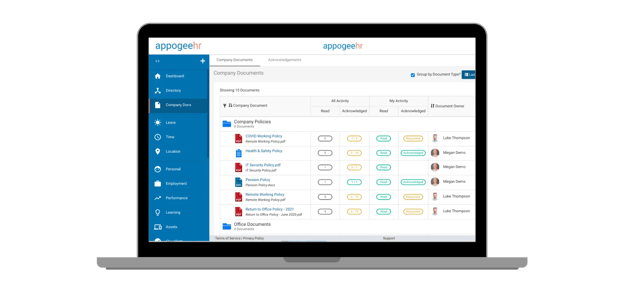
Plus, the technology allows you to set up a system for regularly reviewing and updating policies, ensuring they stay relevant and compliant. This ongoing process helps you remain adaptable to changes while maintaining a structured framework.
3. Legal compliance
Startups must regularly review and update their HR policies to comply with evolving laws and regulations. Changes in overtime rules, managing personal information, and anti-discriminatory practices require constant effort.
Regulations such as GDPR1 and Working Time Regulations 19982 mean your business must stay current with critical legal requirements governing data protection and working hours. Complying with GDPR ensures the secure and lawful processing of personal data, safeguarding individuals' privacy. The Working Time Regulations 1998 outline provisions related to working hours, rest breaks, and annual leave, emphasising the importance of maintaining fair and safe working conditions for employees.
Staying informed and aligning your business practices with these regulations is essential to uphold legal standards, foster a compliant workplace, and mitigate potential risks. And considering 55% of the financial penalties3 imposed by the Office of Civil Rights were against small practices, it's critical to make sure your small business has HR systems in place to meet legal compliance requirements.
Automate monitoring regulatory changes and compliance requirements with software that tracks updates to employment laws, data protection regulations, or industry-specific standards. HR reporting tools allow you to make the necessary policy and practice adjustments promptly. This proactive approach helps you avoid compliance issues and ensures that your HR practices align with the latest legal requirements.
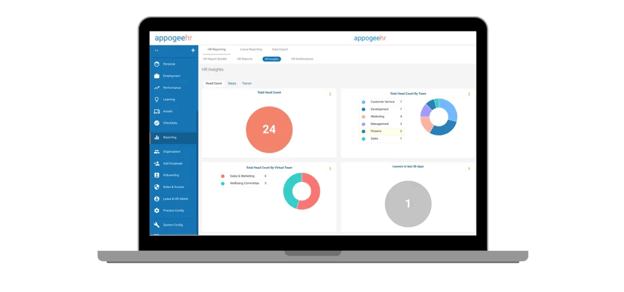
4. Recruitment process
Onboarding is a critical phase that sets the tone for an employee's experience within your business. It involves more than just paperwork; it should encompass introducing new hires to the company culture, values, and expectations.
Since 30% of new hires4 leave within 90 days, a well-designed recruitment process with fair and consistent hiring practices is vital. It enhances the chances of attracting the right talent and lays the foundation for long-term employee satisfaction and retention.
Create a welcoming and inclusive environment and make new hires feel embraced and valued with online employee onboarding software.
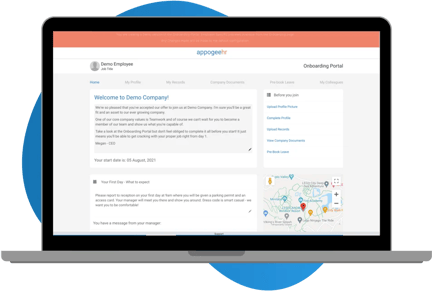
Appogee HR Success lets you set up a personalised employee onboarding portal, allowing new hires to share essential information before their start date. This portal informs new hires with welcome messages, introduces them to their team, provides updates on upcoming absences, and ensures ongoing engagement with the business.
- “The onboarding portal has been great for employees to fill out forms and upload documents in time for their induction” –Jess Churchill, Employee Relations Team at Envelopes Limited
Ensure equal opportunities for all candidates, regardless of background. This includes implementing unbiased recruitment processes, using inclusive language in job descriptions, and actively seeking diverse talent pools. Encouraging diversity allows you to access various skills and ideas, creating a more innovative and dynamic workforce.
Ensure new team members have access to all the necessary information for seamless integration into your company. Grant them access to specific documents, like health and safety policies, before their first day and allow new starters to familiarise themselves with essential information.
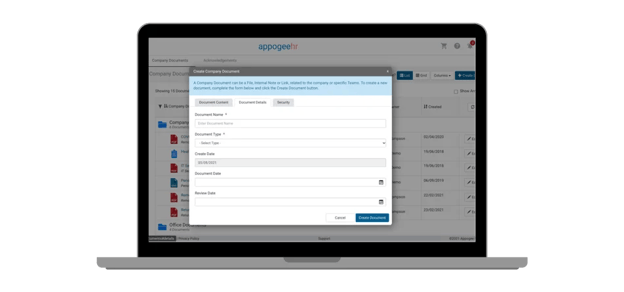
5. Compensation and benefits
Compensation and benefits play a pivotal role in any new startup. They can attract talented workers, make employees happy, and encourage them to work hard.
When creating a compensation and benefits plan, you must consider what employees need and your startup can afford. The aim is to make a package that employees benefit from and that your company can manage financially. This includes offering:
- Fair and competitive pay. Attract and retain top talent by evaluating industry standards, regional salary benchmarks, and employees' unique skill sets. Ensure competitive and equitable compensation by establishing transparent pay structures to build trust.
- An equitable bonus structure. A well-designed bonus structure is a powerful incentive, motivating employees to excel. The structure should be transparent and align with individual and organisational performance goals. A fair bonus system recognises and rewards employees for their contributions, encouraging a culture of high performance and dedication.
- Comprehensive leave policies. Promote a healthy work-life balance and enhance employee well-being. Offering various annual, sick, and parental leave ensures a balance between providing sufficient time off for personal needs and sustaining smooth business operations.
- Health and wellness benefits. This may include health insurance, dental and vision coverage, mental health support, and wellness programs. These benefits not only enhance the overall well-being of employees but also demonstrate a commitment to the welfare of its people.
6. Retirement and financial planning
Over the past four decades, the employment rate for individuals aged 50 to 64 has shown a significant long-term increase–rising from 55.8% to 71.3%.

But why is this upward trend important for startups? Well, tapping into experienced and skilled older employees can bring diverse perspectives, a wealth of industry knowledge, and a strong work ethic to any new business.
Additionally, it broadens the pool of potential hires for startup businesses, allowing you to access a valuable talent pool and enhance overall competitiveness in the market.
Having an older workforce offers significant benefits, but there are also essential HR considerations. Some of these include offering retirement benefits and financial planning support–vital for long-term employee satisfaction. This demonstrates a commitment to future well-being and fosters a sense of security, job satisfaction, and loyalty.
Providing options such as 401(k) plans, employer contributions, and financial education resources can help your people plan for their future and reinforce a commitment to their financial well-being.
Investing in HR reporting and analytics software can provide real-time data about employee retirement rates, average length of service, and age of employees, as well as satisfaction rates.
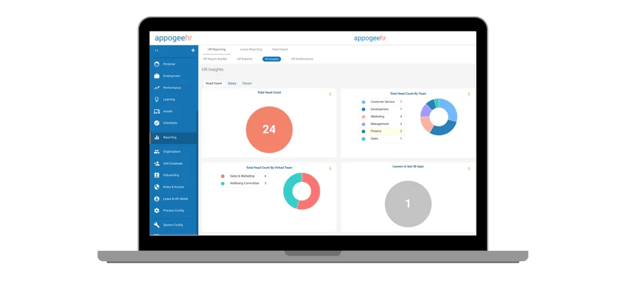
7. Employee engagement
According to the State of the Global Workplace 2023 Report by Gallup, just 23% of employees are engaged at work. This means the overwhelming majority (77%) need greater job satisfaction and a better connection to their work.
The data also emphasises the room for improvement in employee engagement, highlighting the importance for new and old businesses to focus on strategies and initiatives that create a more engaged and motivated workforce.
Keep your people engaged and motivated with solid and effective systems for evaluating and enhancing employee performance. By providing clear expectations, constructive feedback, like 360-degree feedback, recognition for achievements, and opportunities for professional development, your startup can aim to maintain high levels of employee engagement and motivation–leading to a more productive and satisfied workforce.
Why not promote a positive workplace culture and improve employee engagement with employee shoutouts? Publicly thank a staff member for doing something well, such as providing exceptional customer service or organising a team-building activity.
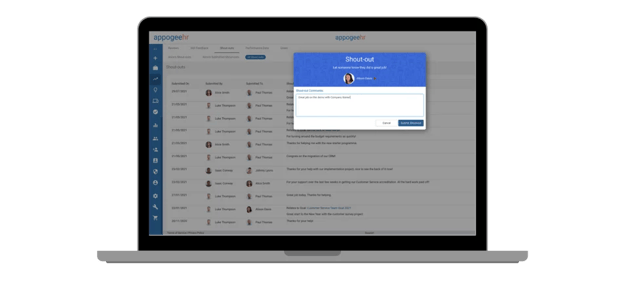
And the best part? Publicly acknowledging and praising an employee's accomplishments provides positive reinforcement. This recognition reinforces the idea that hard work and dedication are valued, encouraging a team member to continue putting in effort and contributing positively to the team.
8. Training and development
Supporting employee development is beneficial for both personal and business growth. It allows employees to enhance their skills and advance in their careers, fostering skill improvement and career progression. It also improves employee performance, resulting in a more skilled workforce. As employees acquire new skills and stay current on industry trends, they become more efficient and productive, ultimately boosting overall business productivity and success.
Let's consider that and use a startup technology company as an example. Since the tech industry has continual and often rapid advancements, failure to invest in continuous training can quickly lead to skill gaps. This means employees initially hired with cutting-edge skills in a particular programming language may struggle when the company transitions to a newer technology–leading to delays in project timelines and a loss of competitive edge.
Implementing effective retention strategies for top talent requires a thoughtful and comprehensive approach.
Develop a learning and development strategy that includes leadership development and building an environment where employees feel valued, involved, and motivated to contribute to long-term success.
And with over half of UK workers5 thinking about changing jobs to avoid their boss, leadership development programs are crucial. By providing training, mentorship, and coaching, organisations can empower their leaders to inspire, guide, and retain top talent within their teams. These programs can improve leadership qualities, creating a positive workplace where employees want to stay and contribute.
Secondly, objectives and Key Results (OKRs) align employees with your company goals. This ensures mutual visibility and clear communication around what’s expected, makes it easier for your staff to move towards their training and development goals, and understands their progress.
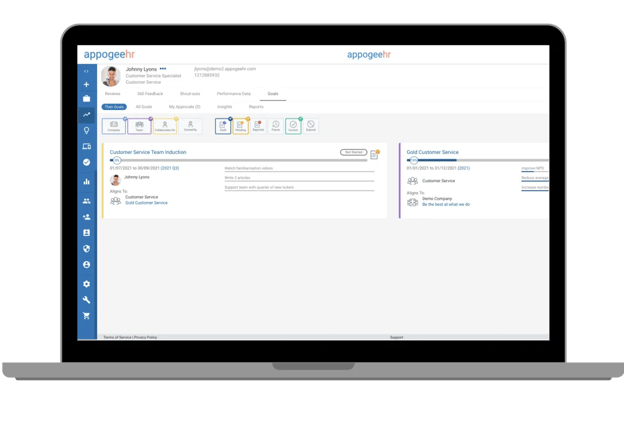
Finally, create clear career paths for all employees, showing possible directions for their future. This helps top talent see themselves growing within your company, keeping them engaged and less likely to look for opportunities elsewhere.
Ramp up your startup HR functions with Appogee HR
Starting a new business is exciting, yet it presents unique challenges. From recruiting the right talent to shaping workplace culture and adhering to legal guidelines, robust HR operations are critical to your business's success.
But it doesn’t have to feel overwhelming.
Appogee HR's award-winning software simplifies HR tasks like employee recruitment, onboarding, and compliance management. This saves time and lets you focus on fostering a positive workplace culture and driving your startup business toward success.
Book a free demo with our experts today, or start a 14-day free trial and try them out yourself.
1. EUGDPR
2. Legislation.gov.uk
3. HIPAA
4. Harvard Business Review
5. StandOut CV
.webp?height=168&name=appogeehr%20(1).webp)


-1.png?width=620&height=372&name=Untitled%20design%20(80)-1.png)

